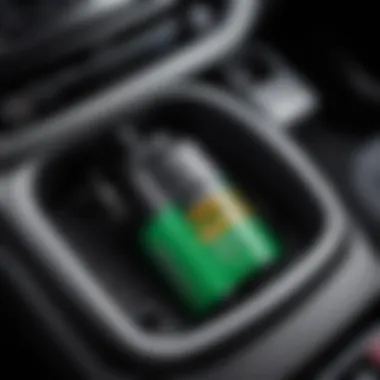Understanding the Importance of Power Steering Fluid for Hyundai Solaris


Intro
Understanding power steering fluid is crucial for every Hyundai Solaris owner. This fluid plays a vital role in the steering system, making it important not only for smooth maneuverability but also for overall vehicle safety. In this section, we will explore the significance of this fluid and how it contributes to the functionality of your Solaris. Recognizing the different types of power steering fluids and their properties helps in maintaining your vehicle effectively.
Обзор автомобиля
Основные характеристики
The Hyundai Solaris is a popular vehicle known for its reliability and efficiency. It combines comfort with performance, making it suitable for various driving conditions. Owners appreciate its fuel economy and affordable maintenance. The Solaris is equipped with modern features that enhance the driving experience, including a responsive steering system supported by power steering fluid.
Описание двигателей и трансмиссий
Hyundai Solaris typically offers different engine options. These may include a 1.4-liter and a 1.6-liter engine, often paired with manual or automatic transmissions. The choice of engine can influence the type of power steering system installed. Most newer models use hydraulic power steering, which requires specific fluid types to ensure optimal functioning.
Выбор автозапчастей
Разновидности запчастей
When selecting parts, especially fluid, it is essential to consider the manufacturer’s specifications. Common types of power steering fluids for Hyundai Solaris include mineral-based and synthetic fluids. Each type has unique properties that affect its performance in different temperatures and conditions.
Как выбрать качественные запчасти
Choosing high-quality parts ensures longevity and reliability. Look for recommended brands that meet Hyundai’s specifications. Carefully read the labels to prevent using incompatible fluids that could harm your steering system. Checking reviews and seeking recommendations can guide you towards reputable options.
"Using the correct power steering fluid is crucial for the longevity of the steering system and overall vehicle performance."
Intro to Power Steering in Hyundai Solaris
Power steering is an essential aspect of modern automotive technology, notably enhancing the driving experience for many vehicle owners. For the Hyundai Solaris, understanding the nuances of this system is crucial. The power steering mechanism allows drivers to steer their vehicles more easily, particularly in tight situations and during low-speed maneuvers. Moreover, it plays a significant role in ensuring safety by providing precision and control during driving.
Overview of Steering Systems
Steering systems in cars have evolved significantly over the years. Traditional systems are often mechanically linked and require more physical effort to steer. In contrast, power steering systems utilize hydraulic or electric assistance to reduce the amount of force needed to turn the steering wheel.
In the Hyundai Solaris, the power steering system primarily relies on hydraulic fluid to amplify the driver's input. This fluid circulates through a series of components, including the pump and steering gear, allowing for a smoother steering response. In summary, modern steering systems enhance not just the driving experience but also the functional aspects of vehicle control.
Significance of Power Steering Fluid
Power steering fluid is a critical component in maintaining the effectiveness of the steering system. It allows for the transfer of power from the steering wheel to the wheels, aiding in the ease of maneuvering. The correct type of fluid ensures optimal pressure and efficiency, reducing wear on system components.
Using the manufacturer's recommended power steering fluid can prolong the life of the system and improve vehicle handling. Neglecting this aspect could lead to problems such as steering difficulty, noisy operation, and potential damage to the components. Thus, understanding power steering fluid's significance is vital for every Hyundai Solaris owner, as it directly impacts their driving efficiency and safety.
"Proper maintenance of power steering fluid is crucial for the longevity and performance of your vehicle's steering system."
In summary, power steering fluid in the Hyundai Solaris is much more than a mere liquid. It is an essential element that affects overall performance, safety, and driving comfort. Understanding its role helps vehicle owners take better care of their cars and ensure smooth operation on the road.
Types of Power Steering Fluids
Understanding the different types of power steering fluids is crucial for maintaining the performance and lifespan of the Hyundai Solaris. Each type of fluid offers unique properties and benefits, influencing steering efficacy, vehicle handling, and overall longevity of the vehicle's power steering system. Selecting the correct type can prevent unnecessary damage and enhance the driving experience, thus making this section particularly relevant.
Mineral Oil-Based Fluids
Mineral oil-based fluids are among the most traditional types of power steering fluids. They are derived from refined crude oil, which allows them to serve as a reliable option for many vehicle models, including the Hyundai Solaris. This type of fluid provides adequate lubrication, helping to reduce friction within the steering system. They are generally affordable and widely available.
However, mineral oil-based fluids do come with some limitations. They can degrade over time, especially when exposed to high temperatures. This degradation may lead to a decrease in viscosity, resulting in poorer performance. It is essential for Hyundai Solaris owners to check the fluid regularly to ensure it maintains its operational properties. Additionally, since these fluids can be more prone to oxidation, proper monitoring can help prevent long-term damage to the steering system.
Synthetic Power Steering Fluids
Synthetic power steering fluids represent a more modern advancement in steering fluid technology. These fluids are engineered to provide enhanced performance under various driving conditions. Their molecular structure is designed to resist thermal breakdown and maintain viscosity across a wider temperature range than mineral oils.
One significant advantage of synthetic fluids is their ability to offer better lubrication and protection. This leads to reduced wear on components, which can promote a longer lifespan for the steering system. Additionally, synthetic fluids can help improve responsiveness in steering, delivering a smoother driving experience. Many mechanics recommend switching to synthetic fluids for improved efficiency, especially in extreme driving conditions. However, it is essential to verify compatibility with the Hyundai Solaris before making this change.
Atf-Based Fluids
Automatic Transmission Fluid (ATF) is a specialized fluid often used in power steering systems. Many manufacturers, including Hyundai, may recommend ATF for specific models, emphasizing its multi-functional properties. ATF is designed to work effectively in both automatic transmissions and power steering applications, which means it includes additives that can offer improved lubrication and protection.
The primary appeal of ATF-based fluids lies in their ability to remain stable under a broad range of operating temperatures. This stability can be particularly beneficial for drivers in regions with extreme weather changes. However, not all Hyundai Solaris models are designed to use ATF, so consulting the vehicle's manual is important. Moreover, once ATF is introduced into the system, it is critical to follow specific replacement intervals and avoid mixing different fluid types to maintain optimal performance.


Specifications for Hyundai Solaris
Understanding the specifications for power steering fluid in the Hyundai Solaris is crucial to ensure optimal performance of the vehicle's steering system. The correct fluid not only enhances the steering feel but also contributes to the longevity of the components involved.
Importance of Manufacturer Specifications
Hyundai provides detailed recommendations regarding the type and quality of power steering fluid suitable for the Solaris. Using the specified fluid type ensures compatibility with the hydraulic system, promoting its efficiency and preventing potential failures. Manufacturer specifications are based on extensive testing and engineering evaluations designed to fit the vehicle’s unique requirements. Failure to use the recommended fluid can lead to reduced performance and sometimes, damage to the system.
Manufacturer Recommendations
Hyundai recommends using specifically formulated power steering fluids for the Solaris. This recommendation is often based on multiple factors, including:
- Chemical Composition: The fluid needs to contain specific additives that provide proper lubrication, corrosion resistance, and thermal stability.
- Viscosity Levels: The viscosity of the power steering fluid is vital for smooth operation under varying temperature conditions; thus, using the right fluid helps maintain appropriate viscosity.
- Fluid Type: Whether it is mineral oil-based or synthetic, the type of fluid impacts performance and longevity of the steering system.
Using other types of fluid can introduce risks associated with chemical reactions, which may undermine system integrity. Tools like the owner’s manual can guide to the correct fluid.
Performance Standards
Beyond manufacturer recommendations, power steering fluids for Hyundai Solaris must meet certain industry performance standards. Adhering to these standards ensures the fluid can effectively handle the demands of the steering system. Some key performance standards include:
- API Standards: These standards help maintain consistency in quality across various manufacturers, ensuring that the fluids perform effectively in real-world conditions.
- SAE Viscosity Ratings: This rating ensures that the fluid can maintain proper viscosity at high and low temperatures, vital for effective steering performance.
- No-foam Quality: A high-quality fluid should resist foaming, which can lead to air bubbles in the steering system, affecting responsiveness and feel.
Fluid Properties and Characteristics
Understanding the properties and characteristics of power steering fluid is crucial for the effective maintenance and operation of the Hyundai Solaris's steering system. Power steering fluid plays a vital role in ensuring smooth steering performance, enhancing driver control, and safeguarding steering components. A well-chosen fluid can extend the life of the steering system by providing necessary lubrication and protection against wear.
Viscosity Considerations
Viscosity is a key property of power steering fluid that affects its performance. It refers to the fluid's resistance to flow. Optimal viscosity ensures that the fluid can easily circulate within the steering system, providing adequate pressure to assist steering efforts.
When selecting a fluid for Hyundai Solaris, it is essential to consider the temperature ranges the vehicle may experience. A fluid with the right viscosity will maintain proper flow and pressure under both hot and cold conditions.
Key points on viscosity:
- Temperature Sensitivity: Higher temperatures may cause fluid to thin, while lower temperatures may thicken it.
- Manufacturer Guidelines: Following Hyundai's recommendations ensures compatibility and performance.
- Fluid Behavior: Check how the fluid behaves under various operating conditions.
Thermal Stability
Thermal stability describes how well the power steering fluid can resist degradation at high temperatures. Fluids that do not maintain thermal stability can break down over time, leading to reduced performance and potential damage to the steering system.
For Hyundai Solaris, choosing a fluid with high thermal stability is vital. This helps in maintaining fluid integrity and effectiveness, even during extended driving in high temperature situations.
An important takeaway is that a quality power steering fluid will have additives that enhance thermal stability, allowing it to function effectively regardless of the environment.
Corrosiveness and Additives
The corrosiveness of power steering fluid can significantly impact the longevity of the steering system components. Some fluids may have chemical compositions that can be harmful to metal parts, seals, and hoses within the system.
To mitigate this risk, many manufacturers include specific additives in their power steering fluids. These additives help protect against rust and corrosion, ensuring that the steering system remains operational over time.
When choosing power steering fluid for the Hyundai Solaris, pay attention to:
- Additive Packages: Opt for fluids that include rust inhibitors and anti-corrosive agents.
- Manufacturer Recommendations: Adhering to Hyundai's suggestions will minimize risks associated with corrosion.
- Fluid Condition: Regularly checking fluid for signs of contamination or degradation can prevent issues down the road.
A well-informed choice of power steering fluid enhances driving comfort and extends the lifespan of the vehicle’s steering system.
Choosing the Right Fluid
Choosing the right power steering fluid is critical for the performance and longevity of your Hyundai Solaris. The fluid provides the necessary hydraulic pressure to assist in steering, influencing both safety and driving comfort. Using an incorrect or substandard fluid can lead to several issues, such as noise, poor handling, or even system failure. Understanding how to select the appropriate fluid ensures that the steering system operates as intended, maintaining vehicle control at all times.
In this section, we will delve into two essential considerations: fluid compatibility and evaluating brand options. These are crucial points that every vehicle owner should pay attention to when it comes to ensuring the efficiency and reliability of their power steering system.
Analyzing Fluid Compatibility
Fluid compatibility refers to how well a particular power steering fluid interacts with the existing fluids in your Hyundai Solaris. Not all fluids are created equal, and using a fluid that is not compatible can lead to problems such as foaming, leaking, or even chemical breakdown of the steering components.
Key factors to consider include:
- Fluid Type: It's important to use a fluid type that meets the original specifications provided by Hyundai. Refer to your owner's manual for guidance.
- Additives: Some fluids contain special additives that could react adversely with those already present in the system, leading to potential damage.
- Age of Existing Fluid: If the current fluid is degraded or contaminated, switching to a new type can cause incompatibility issues. Always ensure a clean system for the best results.
Evaluating Brand Options


When it comes to choosing power steering fluid, brand reputation plays an important role. Not all manufacturers have the same level of quality control or formulation practices.
Consider these aspects while evaluating brand options:
- Manufacturer Recommendations: Always check if the brand has recommendations by Hyundai for use in their vehicles. Some reputable brands provide fluids specifically designed for Hyundai models.
- Performance Ratings: Look for fluids that meet or exceed industry performance ratings. This ensures that the fluid has been rigorously tested.
- User Reviews and Trends: Explore forums like reddit.com or automotive review sites to see what other Hyundai Solaris owners have experienced with various brands. This can give insight into reliability and performance in real-world conditions.
Choosing the right power steering fluid is not merely about picking a type off the shelf. It requires thoughtful consideration of compatibility and brand efficacy. By making informed decisions in these areas, you'll enhance the overall performance of your Hyundai Solaris steering system.
Maintaining Power Steering Fluid Levels
Maintaining power steering fluid levels is essential for optimal steering performance in the Hyundai Solaris. Power steering fluid facilitates ease of steering by transmitting force from the steering wheel to the wheels. A proper fluid level ensures this system operates smoothly, reducing wear and prolonging the life of critical components.
Low fluid levels can cause increased friction in the steering mechanisms, leading to difficulties when turning and potentially resultant damage. On the other hand, overfilling can lead to leaks or excess pressure in the system, both of which can be detrimental. Thus, monitoring fluid levels is a simple yet critical aspect of vehicle maintenance.
Checking Fluid Levels
To check the power steering fluid levels in a Hyundai Solaris, start by opening the hood. Locate the power steering reservoir; it is usually marked with a defining label or symbol. The fluid level should be visible through the reservoir's transparent side or through an indicator marked on the dipstick attached to the cap.
- Ensure the engine is off: Engine heat can affect fluid measurement.
- Visual Inspection: Look for markings indicating minimum and maximum fluid levels. If fluid is below the minimum mark, it is necessary to add more.
- Quality Check: Besides the level, the fluid quality matters. The fluid should be a clear red or pink color. If it appears dark or cloudy, it may indicate contamination or degradation.
Checking fluid levels should ideally be part of regular vehicle checks. Doing this consistently can help prevent larger issues down the road.
Fluid Replacement Intervals
Fluid replacement intervals depend on various factors such as driving conditions and vehicle usage. Generally, manufacturers recommend checking fluid levels every few months, especially if the vehicle is frequently driven in extreme conditions like heavy traffic or harsh weather.
Guidelines suggest changing power steering fluid every 50,000 to 100,000 kilometers, but it is advisable to refer to the Hyundai owner’s manual for specific recommendations pertaining to the Solaris model.
- Signs it is time for replacement:
- Fluid that is dark or has a burnt smell
- Discolored fluid, indicating possible contamination
- Unusual noises when steering, often signaling low fluid levels.
To maintain optimal performance, adhere to these intervals and replace the fluid promptly when needed. This approach not only safeguards critical steering components but also contributes to an overall efficient driving experience.
Regular maintenance can prevent costly repair bills and ensure a safe driving experience.
Common Signs of Power Steering Issues
Recognizing the signs of power steering problems is crucial for maintaining the functionality and safety of the Hyundai Solaris. Timely identification of issues helps prevent more severe mechanical failures and costly repairs. Here, we will explore three primary indicators: fluid leaks, strange noises, and difficulty steering. Each of these signals can provide insight into the health of your power steering system.
Fluid Leaks
Fluid leaks are a common symptom of power steering issues. They can occur for various reasons, including damaged seals or hoses. When the steering system does not have enough fluid, it can lead to several problems.
Key indicators of fluid leaks include:
- Puddles under the vehicle: If you notice red or brown fluid pooling beneath your Hyundai Solaris, it might be power steering fluid.
- Diminished fluid levels: Regular checks of the fluid reservoir can help detect leaks early. If the level drops significantly over a short period, it warrants further investigation.
- Impact on steering performance: As the fluid reduces, steering may become stiff or unresponsive.
Addressing leaks promptly is essential, as continuing to operate the vehicle with insufficient fluid can cause damage to the power steering pump.
Strange Noises
Unusual sounds when steering can also indicate problems within the power steering system. These sounds range from whining to grinding noises and can signal different underlying issues.
Common noises include:
- Whining: A high-pitched whine while turning the wheel may suggest low fluid levels. This sound often indicates that the pump is working harder than it should be to move the fluid.
- Grinding: A grinding noise may signify wear in the steering components or the pump itself. This situation requires immediate attention to prevent further damage.
Listening to the sounds your Hyundai Solaris makes while steering can aid in diagnosing potential power steering issues.
Difficulty Steering
Experiencing difficulty while steering is perhaps the most noticeable indicator of power steering issues. This situation can manifest as a stiffness or resistance when turning the steering wheel.
Considerations regarding difficulty steering include:
- Increased effort: If you find it hard to turn the wheel, it could result from insufficient fluid, damaged components, or the power steering pump failing.
- Steering pull: A vehicle pulling to one side while steering can point to alignment issues or problems with the steering rack.


If driving your Hyundai Solaris becomes less effortless due to steering issues, addressing them swiftly is necessary to ensure both safety and longevity of the vehicle.
Identifying signs of power steering issues early can save money and ensure safer driving. Ignoring these problems can lead to serious mechanical failures.
Addressing Power Steering Fluid Problems
In any vehicle, maintaining optimal functionality of the steering system is crucial. For Hyundai Solaris owners, addressing power steering fluid problems can mean the difference between a smooth driving experience and the annoyance of handling issues. A well-maintained power steering system not only guarantees driver comfort but also enhances the overall safety of the vehicle. The focus here is on identifying potential fluid issues and the necessary steps to remedy them.
Identifying Fluid Contamination
Fluid contamination is a significant concern when it comes to power steering systems. Contaminants can originate from various sources including dirt, metal shavings, and moisture. These can enter the system through worn seals or loose connections. Identifying contamination early is vital to prevent damage to steering components.
To detect fluid contamination, one can perform a visual inspection of the power steering fluid. Fresh power steering fluid is usually clear or slightly amber and has a viscous consistency. If you notice a milky or dark appearance, it may indicate that water or dirt has compromised the fluid. Inspecting for any unusual odors can also be a useful indicator; burnt smells suggest overheating or breakdown of the fluid's components.
Signs of Contaminated Fluid:
- Discoloration: Fluid appears darker or milky.
- Odor: Noticeable burning smell from the system.
- Performance Issues: Noticeable steering resistance or noise.
Addressing fluid contamination involves a systematic approach. Avoid driving with contaminated fluid, as it could lead to more severe damage. Regular checks and maintenance can mitigate these problems.
Flushing the System
If contamination is detected, flushing the power steering system becomes necessary. Flushing removes old fluid and sediment that may be detrimental to system functionality. This process helps restore efficiency and prevents further issues.
The flushing process usually follows these steps:
- Preparation: Gather necessary tools like a fluid pump, new power steering fluid, and a container for collecting old fluid.
- Drain Old Fluid: Locate the power steering reservoir and drain the old fluid completely. Ensure that no residue remains to offer a clean slate.
- Flush the System: Use a flush solution or new fluid to push out any remaining contaminants. Running the pump while adding fresh fluid aids in the thorough cleaning of the system.
- Replace Fluid: After proper flushing, refill the system with the recommended type of power steering fluid, as specified by the manufacturer.
- Check for Leaks: After the procedure, inspect connections and the reservoir for signs of leakage.
Tip: It is recommended to flush the power steering fluid regularly, based on mileage or as advised by a professional mechanic. Not only does this prevent issues, but it also maximizes the longevity of the steering components.
By regularly monitoring the power steering fluid and addressing contamination promptly, Hyundai Solaris owners can ensure that their steering system operates efficiently.
Environmentally Friendly Practices
In the context of power steering fluid management for Hyundai Solaris, environmentally friendly practices play a crucial role. These practices not only enhance the longevity of the vehicle's steering system but also promote sustainability. By adopting responsible fluid management over the lifespan of the vehicle, owners can significantly reduce their environmental footprint.
Understanding the implications of fluid disposal and replacement is essential. The improper disposal of power steering fluid can lead to contamination of soil and water, affecting ecosystems. Furthermore, choosing eco-friendly alternatives can improve not only how the vehicle operates but also the overall health of the environment.
It is wise to recognize the importance of these practices in today’s world. With growing concerns about climate change and pollution, being proactive in fluid management reflects a commitment to both individual and collective responsibility towards the environment.
Recycling Used Fluids
Recycling used power steering fluid is a responsible practice that should not be overlooked. Proper recycling prevents harmful substances from entering landfills and water systems. Many communities have designated hazardous waste facilities that accept used automotive fluids. By taking used fluids to these locations, you contribute to a system that reclaims valuable materials, which can be reused in production.
The recycling process not only mitigates environmental damage but also fosters resource conservation. For instance, recycling fluids can help reclaim valuable base oils that can be processed and reused to create new products. By participating in recycling efforts, Hyundai Solaris owners help reduce waste and promote a circular economy.
Becoming aware of local recycling options is essential. Many auto parts stores also offer recycling programs, providing an accessible means for disposing of power steering fluid correctly.
Eco-Friendly Fluid Alternatives
Choosing eco-friendly fluid alternatives can enhance both vehicle performance and environmental integrity. Many manufacturers now offer biodegradable or environmentally safe power steering fluids. These alternatives are formulated to minimize environmental impact while still meeting the performance requirements of the Hyundai Solaris.
Typically, these biodegradable formulas use renewable resources, which contributes to sustainability. Benefits of opting for eco-friendly alternatives include:
- Reduced Toxicity: Less harmful to aquatic life and ecosystems.
- Lower Carbon Footprint: Produced with fewer carbon-emitting processes.
- Performance Parity: Meet or exceed the standards of traditional fluids.
Before making any changes, it is advisable to consult the Hyundai Solaris' owner manual or speak with a qualified mechanic. Ensuring compatibility with existing components is vital to maintaining the efficiency and safety of the vehicle's steering system.
In summary, adopting environmentally friendly practices regarding power steering fluid management is essential for Hyundai Solaris owners. From responsibly recycling used fluids to choosing eco-friendly options, these steps contribute to a sustainable future, enhancing both vehicle performance and environmental health.
Finale
The topic of power steering fluid for the Hyundai Solaris is vital for ensuring optimal steering performance and vehicle safety. The conclusion of this article emphasizes the key elements discussed and their implications for vehicle owners.
Regular maintenance and proper fluid management can significantly extend the life of the power steering system, reducing the risk of costly repairs. Understanding the types of fluids available, how to maintain them, and recognizing signs of fluid-related issues forms the foundation of effective vehicle management. Vehicle owners must prioritize the correct fluid to prevent problems that could arise from contamination or incorrect fluid types.
Recap of Key Points
- Power Steering Fluid Types: Knowledge of mineral oil-based, synthetic, and ATF-based fluids is crucial for making informed choices.
- Specifications for Hyundai Solaris: Adhering to manufacturer recommendations and performance standards enhances reliability.
- Fluid Properties: Awareness about viscosity, thermal stability, and additives ensures the right product is used.
- Maintenance Practices: Regular checks and timely fluid replacements are essential to avoid steering difficulties.
- Common Issues: Identifying fluid leaks, recognizing strange noises, and noting difficulties in steering are key to early detection of problems.
- Sustainable Practices: Recycling used fluids and considering eco-friendly alternatives can contribute to environmental well-being.
Final Thoughts on Maintenance
Maintaining the power steering fluid should be seen as an ongoing responsibility for Hyundai Solaris owners. Regular inspections for leaks and monitoring fluid levels are practical steps that should not be overlooked. Over time, the accumulation of contaminants can significantly affect the steering fluid's performance. Thus, adhering to replacement intervals outlined in the manufacturer's guidelines is equally important.
The use of high-quality fluids will ensure the longevity of the steering system. Ultimately, a well-maintained power steering system allows for smooth navigation and better driving experience. Vehicle owners are encouraged to stay informed and proactive in managing their power steering fluid for consistent vehicle performance.







